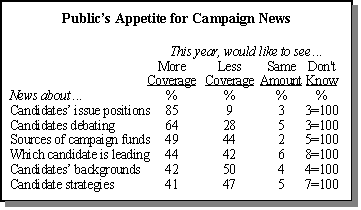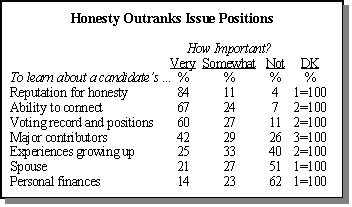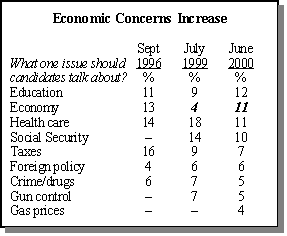Coverage of Issues, Debates Popular …
Most Americans say they want news organizations to tell them what the candidates stand for — not what they are like personally. Fully 85% say they want more news coverage of the candidates discussing their positions on issues, while 64% want more coverage of the candidates debating each other.

At the same time, half of Americans say they want less news coverage of the candidates discussing their personal backgrounds and experiences. This level of dissatisfaction with coverage of candidates’ backgrounds and experiences reflects a significant jump from the 41% who wanted less of this type of coverage in the fall of 1991.
The public is more evenly divided over news coverage of campaign finances — 49% would like more coverage about the sources of candidates’ campaign money, while 44% would like to see less coverage. Similarly, 44% would like more coverage about which candidate is leading in the polls and just 41% would like more news about the strategies candidates are using in their campaigns.
Men are slightly more interested than women in news coverage about the debates and candidate fund-raising. Fully 69% of men say they want more coverage of the candidates debating, for example, compared to 58% of women. Similarly, more than half of men (52%) would like more coverage about the sources of candidates’ campaign money, compared to just 45% of women.
There are few real differences between those who want to see more coverage of these topics and those who want to see less coverage when it comes to rating press coverage of the campaign, with one exception. Among those who would like to see more news coverage of which candidate is leading in the polls, 55% give press coverage of the campaign a rating of excellent or good. In contrast, just 46% of those who would like less coverage about which candidate is ahead give the press as favorable a rating.
… But Character Still Most Important

Even as Americans look for more coverage of campaign issues and less coverage of candidates’ backgrounds and experiences, several key personal characteristics nonetheless remain at the top of the list of things voters want to learn before Election Day. Fully 84% of Americans say it is very important for them to learn about a candidate’s reputation for honesty, and 67% say it’s very important to learn how well a candidate connects with average people.
Notably, each of these factors are seen as important by more people than say the same about a candidate’s voting record or policy positions, which is rated as very important by 60% of Americans. Just 42% say learning about a candidate’s major campaign contributors is very important, while one-in-four want to learn about a candidate’s experiences growing up.
For some of these characteristics, the things voters want most to learn about the candidates varies across party lines. Republicans are nearly unanimous in rating a candidate’s reputation for honesty as very important (92%), while 84% of independents and just 78% of Democrats say the same. In contrast, Democrats care more about whether candidates can connect with average people. Fully 71% of Democrats say this is a very important quality to learn about, compared to 62% of Republicans.
Economy, Gas Prices Emerging Issues

Education, health care, and Social Security top the list of issues people want the candidates to talk about this year. But the economy may be emerging as a more important campaign issue for voters, as well.
Roughly one-in-ten Americans (11%) mentioned economic issues when asked what one issue they would most like to hear the candidates talk about. This puts the economy on a par with education (12%), health care (11%), and Social Security (10%), and is a substantial increase from the 4% who volunteered issues having to do with the economy a year ago. Another 4% of Americans mentioned gas prices as the one issue they want the candidates to focus on.
Talk about the government’s budget surplus over the past several years seems to have eased much of the public concern about federal spending and the national debt. Just 2% mentioned the federal budget and debt as the issue they most want candidates to talk about, down from as many as 14% in 1995.
Many See Need for Change
If this election is a debate over change versus continuity, Americans are narrowly divided on the question– though slightly more see a need for major change. Nearly half (47%) say it is more important for the next president to make major changes in national policy to solve problems that are not getting any better, while 41% say the next president should continue policies that are now leading to improved conditions around the country.

Not surprisingly, most Republicans — 61% — say the country needs major changes, while on balance Democrats favor continuity (49% say continue current policies, 40% say make major changes). Independents are evenly divided, with 42% favoring current policies and 45% favoring major change.
Americans are not as narrowly divided on the question of continuing the policies of the Clinton presidency, however. Just 40% say they would like the next president to offer programs similar to those of the Clinton administration, while 52% want a president who offers different policies and programs. While opinion on this question falls sharply along party lines, fully half of independents say they want the next president to pursue different programs and policies.
But regardless of party, Americans across the board believe the country needs strong leadership that tries to solve problems “without worrying how Congress and the Supreme Court might feel.” Nearly two-thirds (63%) favor strong leadership, while just 27% take the opposite view, saying strong leadership might be dangerous. Support for a strong presidency is unchanged from eight years ago, but substantially greater than in the post-Watergate period of 1976.
News Interest Index: Gas Prices Top News Story
The escalating price of gasoline was the month’s top news story. Interest was particularly strong in the Midwest, where gas prices have been highest. Overall, 61% of the public followed this story very closely, but nearly seven-in-ten (69%) of those living in the Midwest tracked it very closely. Interest in gas prices has not been this high since the Persian Gulf crisis in October 1990.
Interest in the presidential campaign has increased slightly, with 23% following it very closely in June compared to 18% in April. More Republicans are paying close attention to the campaign (28%) than either Democrats (24%) or independents (19%). Americans under age 30 continue to show less interest than older people in the election; only 16% are following it very closely, compared to 31% of those age 50 and older.
A federal judge’s ruling that Microsoft should be broken up was followed very closely by 28% of the public. Internet users have taken a particularly strong interest in this story. Nearly one-third (32%) of those who go online followed the ruling very closely compared to 22% of non-Internet users. Men have paid much more attention to this story than women (34% vs. 21%).
One-quarter of the public paid close attention to the reports about missing files from the Los Alamos nuclear laboratory. Republicans have been more in interested in this story than Democrats or independents (35% compared to 21% and 22%, respectively).
The recent summit between President Clinton and Russian President Putin was followed very closely by only 9% of the public. That is about the same percentage that paid close attention to Clinton’s 1997 summit with former Russian President Boris Yeltsin. There has been a steep decline in attention to these meetings since the end of the Cold War; fully one-third of the public closely followed President George Bush’s summit with Soviet leader Mikhail Gorbachev a decade ago.




